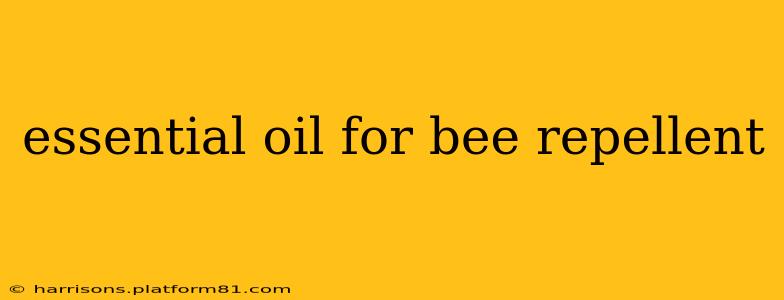Bees are vital pollinators, but their stings can be painful and even dangerous for those with allergies. While it's crucial to protect bees and their habitats, understanding how to deter them from unwanted areas can be beneficial. This guide explores the effectiveness of essential oils as a bee repellent, addressing common questions and concerns.
Note: While some essential oils may deter bees temporarily, they are not a foolproof solution. It's crucial to understand bee behavior and take appropriate precautions around beehives and active nests. This information is for educational purposes and should not be considered a replacement for professional pest control advice. Always prioritize the safety and wellbeing of bees.
What Essential Oils Repel Bees?
Several essential oils exhibit properties that may deter bees, although the effectiveness varies depending on factors like concentration, wind conditions, and the bee species. Some of the most frequently cited include:
-
Citronella: This is a popular choice for insect repellents in general, and anecdotal evidence suggests it may also deter bees. Its strong citrusy scent may mask floral scents that attract bees.
-
Lemongrass: Similar to citronella, lemongrass oil has a potent, citrusy aroma that can potentially disrupt bees' foraging behavior.
-
Peppermint: The strong, minty aroma of peppermint oil is known to repel several insects, and some beekeepers claim it may offer some level of deterrence.
-
Eucalyptus: Eucalyptus oil's strong scent may also contribute to a less attractive environment for bees.
Do Essential Oils Really Work to Repel Bees?
The effectiveness of essential oils as bee repellents is debatable. While some people report success, scientific evidence supporting their widespread use is limited. The scent may temporarily mask attractive floral scents or create a less desirable environment, but it won't eliminate the bees' natural attraction to nectar and pollen sources.
The concentration of the essential oil is crucial. Diluted solutions are less likely to be effective, and even high concentrations might only provide temporary relief.
How to Use Essential Oils to Deter Bees?
If you choose to try essential oils as a bee deterrent, remember these points:
-
Dilution: Always dilute essential oils appropriately. Using undiluted essential oils can be harmful to both humans and bees.
-
Application: Apply diluted essential oils to surfaces where you want to discourage bees, such as windowsills, patios, or outdoor furniture. Avoid spraying directly onto plants as it could harm beneficial insects.
-
Reapplication: The effect of essential oils is usually temporary. Reapplication may be necessary, especially after rain or wind.
Are Essential Oils Safe for Bees?
While the concentrated application of some essential oils can be harmful to bees, using diluted mixtures in a controlled manner may pose less of a direct threat. However, the long-term effects of using these oils to deter bees are not well-studied. It's crucial to remember that disrupting bee foraging patterns is detrimental to their survival and the ecosystem.
What Are Better Alternatives to Essential Oils for Bee Repellent?
Instead of relying on essential oils, which offer limited and unreliable results, consider these safer and more effective approaches:
-
Remove attractants: Eliminate sources of food and water that might lure bees, such as overflowing trash cans, spilled sugary drinks, and ripe fruit.
-
Professional bee removal: If you have a beehive on your property, contacting a professional beekeeper or pest control specialist is the safest and most effective solution. They can safely relocate the hive.
-
Protective clothing: Wearing protective clothing such as long sleeves, long pants, and a hat while working outdoors can minimize the risk of bee stings.
What if a Bee is Already Near Me?
Remain calm and avoid swatting. Slow, deliberate movements are less likely to provoke a bee. Move away slowly and carefully. If stung, remove the stinger and clean the area. Seek medical attention if you experience an allergic reaction.
This guide aims to provide comprehensive information on the use of essential oils for bee repellent. Remember, while some essential oils might offer minimal, temporary deterrence, they are not a substitute for responsible bee management and proactive safety measures. Prioritizing bee safety and understanding their crucial role in the environment is paramount.
